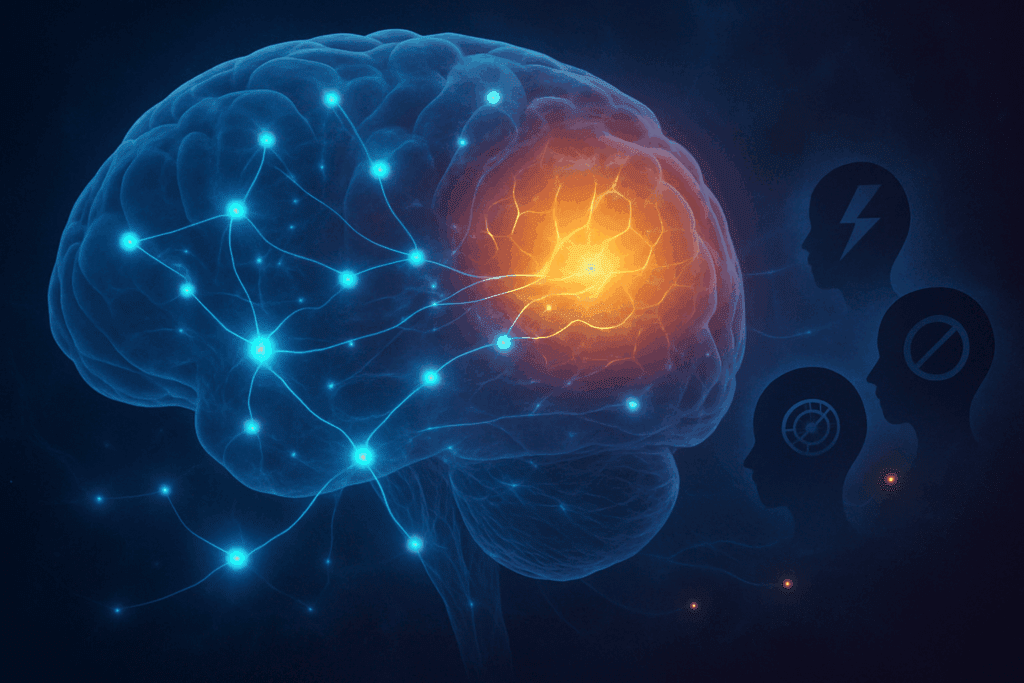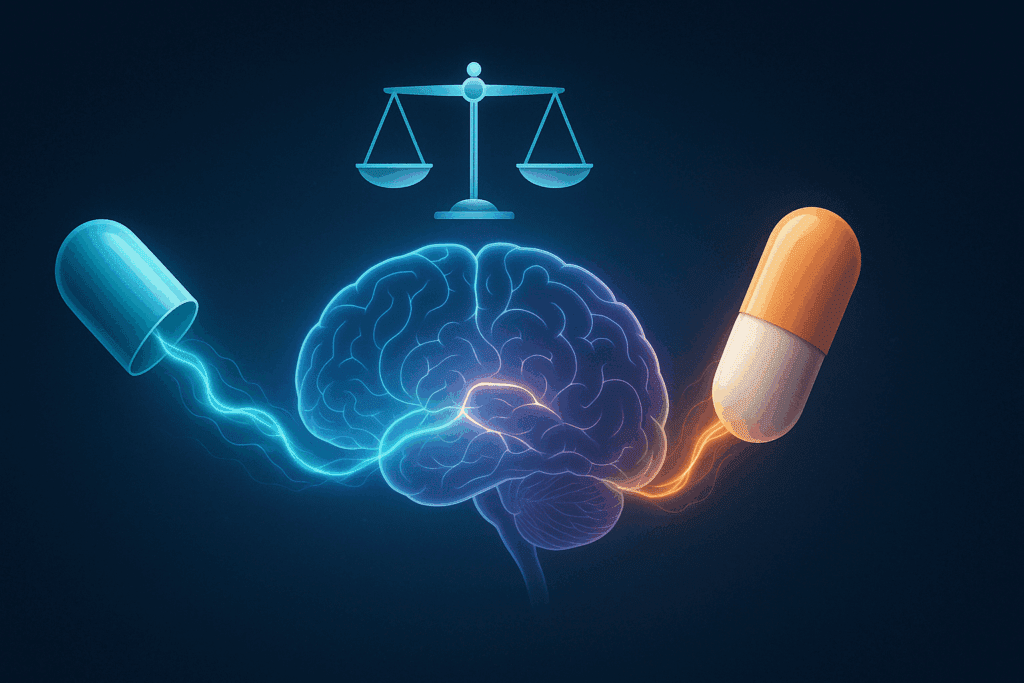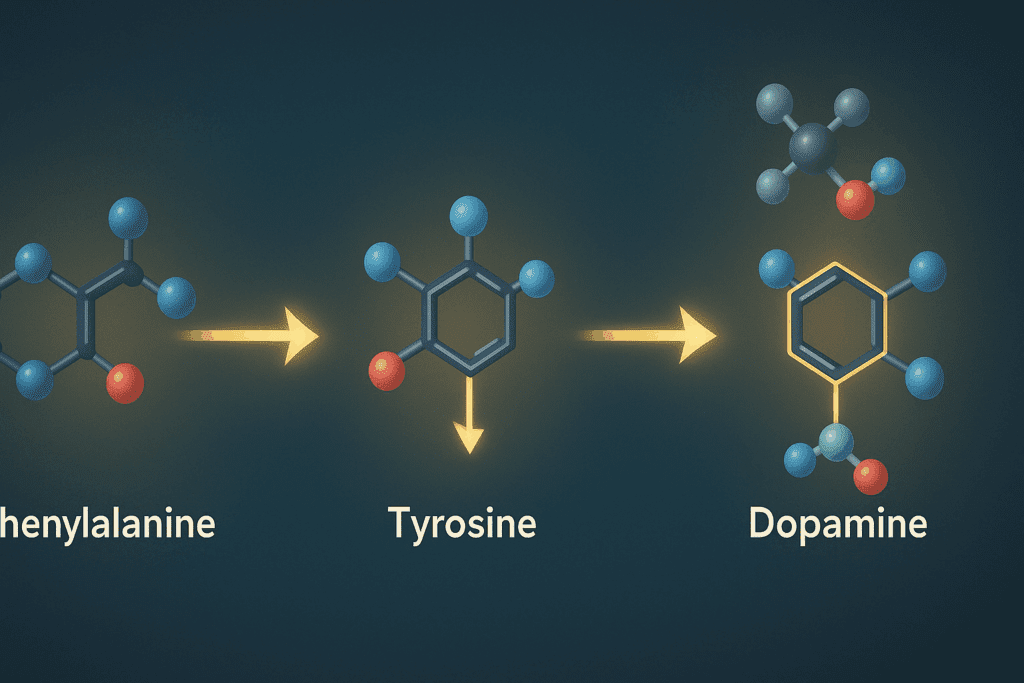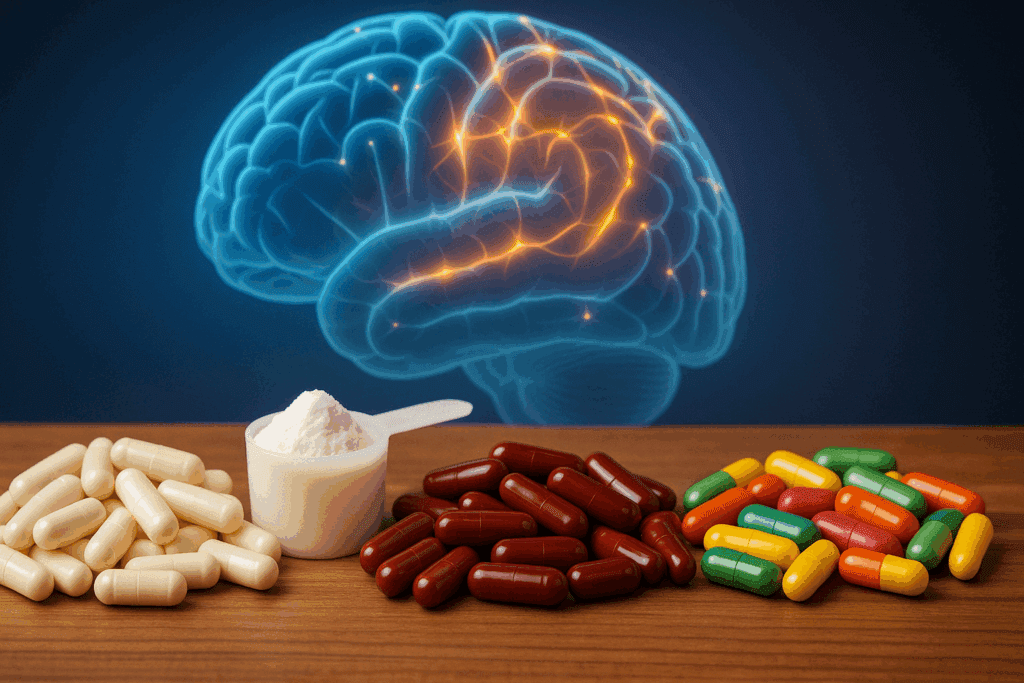Understanding L-Tyrosine and Its Cognitive Relevance
L-Tyrosine is an amino acid that plays a vital role in the biosynthesis of important neurotransmitters such as dopamine, norepinephrine, and epinephrine. These neurotransmitters are central to mental processes like attention, alertness, and mood regulation. Because dopamine dysregulation is a hallmark feature of attention-deficit/hyperactivity disorder (ADHD), there has been increasing interest in exploring the relationship between L-tyrosine and ADHD symptoms, particularly among individuals seeking more natural approaches to cognitive support.
You may also like: How to Choose the Best Brain Supplements for Adults: Science-Backed Ingredients That Support Focus, Memory, and Mental Clarity
The human body can synthesize L-tyrosine from phenylalanine, another dietary amino acid, but the efficiency of this conversion varies based on individual metabolism, stress levels, and nutritional status. Supplementing directly with L-tyrosine provides the body with a more immediate substrate for dopamine production, which is why it has been studied in scenarios involving cognitive demand, stress, and mental fatigue. For those managing ADHD, particularly adults navigating demanding work or academic environments, L-tyrosine may offer promising benefits when conventional stimulant medications cause unwanted side effects or do not provide adequate relief.
It’s important to differentiate between L-tyrosine as a supportive nutrient and a stimulant drug. While L-tyrosine influences dopamine synthesis, it is not a stimulant in the traditional sense. Thus, when people ask, “Is L-tyrosine a stimulant?” or “Is tyrosine a stimulant?” the answer is nuanced. It doesn’t directly activate the central nervous system like amphetamines do, but it supports the systems that may become depleted or dysregulated in chronic ADHD. Understanding this distinction helps clarify why L-tyrosine is gaining traction among those looking for more balanced ways to enhance focus and executive function naturally.

Dopamine, Executive Function, and ADHD
Dopamine is a critical neurotransmitter for motivation, decision-making, impulse control, and sustained attention—all areas typically impaired in individuals with ADHD. In both the inattentive and hyperactive-impulsive types of ADHD, dopamine signaling is believed to be inefficient or underactive in certain brain regions, particularly the prefrontal cortex. This is why medications like Adderall and Vyvanse, which boost dopamine availability, tend to be effective. However, not everyone tolerates these medications well. This has led to a growing interest in supporting dopamine naturally through amino acids for ADHD management, especially for adults who seek long-term cognitive support without pharmaceutical intervention.
Tyrosine and ADHD are closely linked in research exploring how precursors to dopamine might improve cognitive performance under stress or fatigue. L-tyrosine supplementation offers a strategic way to provide the raw material needed for dopamine synthesis, especially in individuals who may already have low baseline levels or who experience stress-related cognitive depletion. Executive function—our ability to plan, prioritize, inhibit impulses, and manage tasks—is heavily influenced by dopamine activity. By enhancing dopamine through nutritional precursors like L-tyrosine, some individuals with ADHD report improvements in focus, task initiation, and reduced mental fatigue.
Moreover, the relationship between L-tyrosine and executive function extends beyond neurotransmitter levels. When dopamine levels are better supported, the brain is more resilient during prolonged mental effort. This is especially valuable in ADHD, where cognitive endurance is often compromised. While amino acid therapy should never replace professional medical advice, it may serve as a valuable adjunct for adults exploring complementary or integrative approaches to ADHD symptom management.

L-Tyrosine and Pharmaceutical Interactions: What to Know About Adderall and Vyvanse
Combining amino acid supplementation with prescription stimulants raises important questions, particularly regarding the interaction between L-tyrosine and ADHD medications like Adderall or Vyvanse. Many people exploring integrative approaches wonder about phrases like “Adderall and L-tyrosine” or “L-tyrosine Vyvanse” to determine whether these pairings are safe or effective. In general, because L-tyrosine is a natural precursor to dopamine and these medications increase dopamine activity through reuptake inhibition, the combination may be complementary—but only under appropriate medical supervision.
When combined thoughtfully, tyrosine and Vyvanse may provide a more stable dopamine baseline, potentially smoothing out the highs and lows that some individuals experience with stimulant medications. However, because both aim to increase dopamine, it’s possible that stacking them could intensify side effects like anxiety, irritability, or insomnia if not dosed carefully. This is why understanding L-tyrosine dosage for ADHD is essential, particularly for individuals already on medication. While typical tyrosine doses for ADHD range from 500 mg to 2,000 mg per day, individual responses vary. Consulting with a qualified healthcare provider familiar with amino acid therapy is always advised.
There’s also anecdotal evidence that suggests taking L-tyrosine earlier in the day—ideally on an empty stomach—may enhance alertness and focus without interfering with the pharmacokinetics of stimulants. Some users experimenting with “Adderall and L-tyrosine” report fewer afternoon crashes or cognitive dips, suggesting a synergistic relationship that warrants further study. Others turn to tyrosine supplementation during medication breaks or on non-medication days to help maintain mental clarity without pharmaceutical input.
How Much L-Tyrosine for ADHD? Navigating Dosage Guidelines
Determining how much L-tyrosine for ADHD is appropriate depends on several factors including body weight, existing dopamine levels, diet, medication use, and stress exposure. There is no one-size-fits-all answer, but the most commonly used therapeutic range for cognitive enhancement falls between 500 mg and 2,000 mg per day, often divided into two or three doses. For those new to amino acid supplementation, it is generally recommended to start at the lower end of this spectrum and gradually increase as needed.
The question of “L-tyrosine ADHD dosage adults” is particularly relevant given that adult ADHD presentations often involve complex stress loads, sleep disruption, and comorbidities such as anxiety or depression. These factors can all influence how tyrosine is metabolized and whether additional cofactors, such as vitamin B6 or magnesium, may be needed to support its conversion to neurotransmitters. Additionally, people with low dietary protein intake or those under chronic psychological stress may benefit more from supplemental tyrosine, as these conditions increase the body’s demand for dopamine and its precursors.
In contrast, excessive tyrosine intake—especially above 3,000 mg daily—may lead to side effects like headache, nausea, or increased heart rate in sensitive individuals. Thus, anyone exploring an L-tyrosine dose for ADHD should be aware of their personal tolerance, medication interactions, and overall nutritional context. Because tyrosine works upstream in the dopamine synthesis pathway, it requires other nutrients and enzymes to function optimally. This is where well-rounded amino acid supplements for ADHD, which include complementary nutrients, may offer a more comprehensive solution than L-tyrosine alone.
The Role of Phenylalanine and Other Amino Acids for ADHD in Adults
Phenylalanine, another dietary amino acid, serves as a precursor to L-tyrosine and plays a foundational role in the same catecholamine pathways. Some nootropic blends and amino acid complexes for ADHD include both L-phenylalanine and L-tyrosine to support multiple stages of dopamine synthesis. The term “L-phenylalanine ADHD” appears frequently in discussions about natural cognitive enhancement, particularly because of phenylalanine’s role in boosting mood, attention, and stress resilience when dopamine levels are suboptimal.
However, it’s essential to distinguish between the D- and L- forms of phenylalanine. While L-phenylalanine is involved in protein synthesis and neurotransmitter production, D-phenylalanine may have different effects on the brain’s pain and mood regulatory systems. Most supplements targeting cognitive function use the L-form to ensure bioavailability for dopamine production. That said, people with phenylketonuria (PKU)—a rare genetic condition—must avoid phenylalanine altogether due to an inability to metabolize it, which highlights the importance of individualized supplementation.
When considering the best amino acids for ADHD, particularly in adults, combinations that support both dopamine and serotonin pathways may yield more robust effects. For example, tyrosine for dopamine, and tryptophan for serotonin, may work together to balance mood, attention, and emotional regulation. Amino acid supplements for ADHD that include these synergies often provide more balanced support than single-ingredient formulas. For individuals navigating complex cognitive demands or stimulant fatigue, these broad-spectrum blends may serve as a foundational pillar in a holistic ADHD support plan.

How Tyrosine Affects Focus, Energy, and Mental Clarity
One of the most compelling aspects of L-tyrosine supplementation is its potential to sharpen focus and mental clarity under conditions of stress or fatigue. Studies have shown that tyrosine can improve cognitive performance during tasks requiring sustained attention, particularly when the brain’s dopamine stores are temporarily depleted. This makes tyrosine a powerful tool for adults with ADHD who frequently experience cognitive burnout or mental fog during the workday.
When people ask whether tyrosine is a stimulant, the confusion often arises from its energizing effects. While not a traditional stimulant, tyrosine enhances catecholamine synthesis, which can boost alertness and improve the speed of information processing. These benefits are particularly noticeable during high-stress situations, making L-tyrosine a useful addition to the routines of those with executive function challenges or high-performance demands. Tyrosine supplement for ADHD is not about artificially jacking up energy levels, but rather about supporting the brain’s natural capacity to stay focused and engaged over time.
There is also evidence to suggest that L-tyrosine may mitigate some of the side effects associated with stimulant medications, such as mood dips or jitteriness. This opens the door to the possibility that L-tyrosine dosage for ADD, when timed strategically, could help smooth transitions in medication efficacy throughout the day. Whether used on its own or in combination with medications, L-tyrosine offers a natural route to improve mental endurance, emotional regulation, and attention span—all of which are core areas of difficulty for those managing ADHD.
Choosing the Right Amino Acid Complex for ADHD Support
Navigating the landscape of amino acid supplements for ADHD can be overwhelming, particularly with the abundance of products claiming to enhance focus, mood, and cognition. The most effective blends go beyond just L-tyrosine and include other co-factors that support neurotransmitter synthesis. These may include vitamin B6, folate, magnesium, zinc, and even adaptogenic herbs like Rhodiola rosea. Together, these compounds help create a neurochemical environment conducive to better focus and executive function.
Many adults searching for amino acids for ADD are also looking to reduce their reliance on pharmaceuticals or to find natural supports during medication gaps. In these cases, amino acid complexes for ADHD offer a structured and well-rounded approach to brain health. Whether the goal is to support attention naturally, enhance resilience under stress, or complement existing treatments, these formulas can be tailored to individual needs with the guidance of a healthcare provider.
Additionally, long-term brain health depends not just on neurotransmitter levels, but also on inflammation control, oxidative stress reduction, and hormonal balance. This is why the best amino acid supplements for ADHD take a systems-level view of cognitive enhancement, incorporating ingredients that work synergistically rather than focusing narrowly on dopamine. A comprehensive approach helps reduce the risk of imbalances or over-reliance on any single mechanism of action.

Frequently Asked Questions: L-Tyrosine and ADHD
1. Can L-Tyrosine help with ADHD symptoms in high-stress environments?
Yes, L-Tyrosine may be particularly helpful for managing ADHD symptoms during periods of cognitive stress. This amino acid plays a role in replenishing dopamine and norepinephrine—two neurotransmitters that often deplete during sustained mental exertion. In high-pressure work or academic settings, L-Tyrosine supplementation may improve attention span and reduce burnout. For individuals considering amino acids for ADHD in adults, especially those exposed to demanding cognitive tasks, tyrosine can offer a targeted strategy for enhancing resilience under stress. However, it’s essential to monitor dosage carefully and consult a healthcare provider, especially when combining l tyrosine and ADHD medications.
2. What’s the relationship between L-Tyrosine and stimulant medications like Adderall or Vyvanse?
L-Tyrosine supports dopamine synthesis, which is the same neurotransmitter pathway targeted by stimulants like Adderall and Vyvanse. While it’s not a replacement, combining adderall and l tyrosine or l tyrosine vyvanse regimens under clinical supervision may smooth out dopamine fluctuations, especially during “comedown” phases. Some clinicians suggest L-Tyrosine can buffer side effects like emotional crashes or fatigue. The relationship between tyrosine and Vyvanse, in particular, is still being explored, but preliminary evidence suggests it may enhance focus while reducing reliance on higher stimulant doses. Always work with a doctor to fine-tune combinations of tyrosine and ADHD medications for safety and efficacy.
3. How much L-Tyrosine should adults take specifically for ADHD?
The ideal l tyrosine dosage for ADHD in adults varies depending on body weight, metabolic rate, and whether it’s taken with medication. A general starting range is 500–1,000 mg once or twice daily, but some studies explore doses up to 2,000 mg. Clinical insight is essential, as excessive tyrosine may cause anxiety, restlessness, or interfere with other neurotransmitter balances. For those asking “how much l tyrosine for ADHD,” the safest approach is to titrate slowly and observe effects. Personalized l tyrosine ADHD dosage adults guidelines are best created with input from an integrative or functional medicine practitioner.
4. Is L-Tyrosine a stimulant like traditional ADHD drugs?
No, L-Tyrosine is not classified as a stimulant, although it may have mild energizing effects due to its role in dopamine production. The question “is l tyrosine a stimulant” often arises because of its alertness-boosting profile, but it lacks the fast-acting, central nervous system activation characteristic of amphetamines. That said, many users report improved mood, concentration, and wakefulness, which can feel similar to stimulant effects. So while tyrosine is not a stimulant pharmacologically, its benefits for ADHD may mimic stimulant-like cognitive enhancements. It’s more accurate to say that tyrosine supports neurotransmitter pathways that stimulants stimulate.
5. What are the best amino acids for ADHD besides Tyrosine?
While L-Tyrosine is widely discussed, other amino acids for ADHD also play a role. L-Theanine can promote calm focus by increasing alpha brain waves and GABA. L-Phenylalanine, a precursor to Tyrosine, is another powerful candidate, especially in individuals with low dopamine baseline. The combination of l phenylalanine ADHD support and tyrosine can create a sustained dopamine modulation effect. When evaluating the best amino acids for ADHD, look for synergistic blends in amino acid supplements for ADHD that also include taurine, glutamine, or acetyl-L-carnitine. An amino acid complex for ADHD can often outperform single-agent solutions.

6. How does L-Tyrosine compare to L-Phenylalanine for ADHD management?
L-Tyrosine is a direct precursor to dopamine, whereas L-Phenylalanine must first convert into Tyrosine before influencing neurotransmitter production. This makes Tyrosine more efficient for fast-acting support. However, l phenylalanine ADHD benefits may include a broader, more gradual impact on mood and motivation. Some clinicians recommend cycling both or using them in a 2:1 ratio for sustained effects. When used in combination, phenylalanine for ADHD and L-Tyrosine can work together to stabilize dopamine output throughout the day.
7. What are the risks of combining L-Tyrosine with prescription ADHD treatments?
While generally well-tolerated, combining ADHD supplement L-Tyrosine with prescription stimulants carries some potential for side effects such as anxiety, elevated heart rate, or insomnia if dosed too high. The overlap in dopaminergic activity between adderall and L-Tyrosine or tyrosine and Vyvanse can increase neurochemical load. This doesn’t mean the combination is unsafe—many practitioners use it therapeutically—but it demands careful monitoring. Users should avoid assuming that more is better, especially if experimenting with l tyrosine dose ADHD stacking. Lab testing for neurotransmitter levels can help personalize protocols.
8. Can L-Tyrosine help during stimulant withdrawal or “medication holidays”?
Yes, L-Tyrosine is sometimes used to support dopamine levels during breaks from ADHD medication. These “medication holidays” are often recommended to assess baseline functioning or reduce tolerance buildup. During these periods, tyrosine supplement for ADHD users can help maintain cognitive performance and mood stability. This application is particularly relevant for teens and adults seeking non-stimulant options or those experiencing post-stimulant fatigue. Amino acids for ADD in this context act as biochemical buffers, helping ease the transition off medications temporarily or long-term.
9. How do individual genetics affect L-Tyrosine’s effectiveness for ADHD?
Genetic polymorphisms in the COMT and MAO genes—which regulate neurotransmitter breakdown—can significantly impact how individuals respond to L-Tyrosine. For example, those with “slow COMT” variants may accumulate dopamine too quickly when using l tyrosine dosage for ADD protocols, leading to agitation or jitteriness. In contrast, fast metabolizers may need higher doses to achieve the same cognitive benefits. Nutrigenomic testing can provide insight into how to personalize l tyrosine dose ADHD strategies. This level of precision supports both safety and long-term efficacy for amino acid-based ADHD support.
10. Are there emerging trends in amino acid supplementation for ADHD?
Yes, the latest innovations in this space involve custom-formulated nootropic stacks that combine several amino acids for ADHD in adults alongside adaptogens and micronutrients. These blends often include the best amino acids for ADHD—like tyrosine, phenylalanine, and theanine—paired with cofactors like B6, zinc, and magnesium. There’s also growing interest in time-release tyrosine formulations to provide smoother effects throughout the day. Advances in brain-targeted delivery systems and AI-based personalization of amino acid supplements for ADHD are reshaping how clinicians approach non-pharmacologic management of attention disorders. These trends are especially promising for individuals seeking a holistic alternative or complement to traditional stimulant therapy.

Final Reflections: Tyrosine Supplementation as a Natural Ally for ADHD Management
For individuals living with ADHD, particularly adults navigating complex professional or academic environments, the search for focus-enhancing strategies is often a deeply personal journey. L-tyrosine stands out as one of the most promising natural options, offering a biologically grounded way to support dopamine synthesis and cognitive performance without relying solely on stimulant medications. Its ability to enhance attention, resilience, and executive function—especially under stress—makes it a compelling ally in the broader conversation about amino acids for ADHD in adults.
The growing interest in phrases like “how much tyrosine for ADHD” or “L-tyrosine dose ADHD” reflects a broader shift toward integrative mental health strategies that consider both physiological and lifestyle factors. As our understanding of the brain evolves, so too does our approach to managing conditions like ADHD. Tyrosine’s role in this landscape is not to replace medical treatments but to augment them—offering a safer, nutrient-based route to cognitive optimization. Whether you’re exploring options like “tyrosine and Vyvanse” interactions or searching for the ideal “L-tyrosine ADHD dosage adults” might tolerate well, the key lies in personalized, informed supplementation.
Ultimately, when integrated thoughtfully into a well-rounded lifestyle—one that includes exercise, sleep hygiene, and nutrient-dense meals—tyrosine supplementation can be a powerful tool. It’s not just about finding the best amino acids for ADHD but about empowering the brain to perform at its full potential. With ongoing research and responsible use, L-tyrosine may continue to offer hope, clarity, and a sense of focus to those seeking natural cognitive enhancement in a distracted world.
Further Reading:
Can L-Tyrosine Help With ADHD Symptoms?


